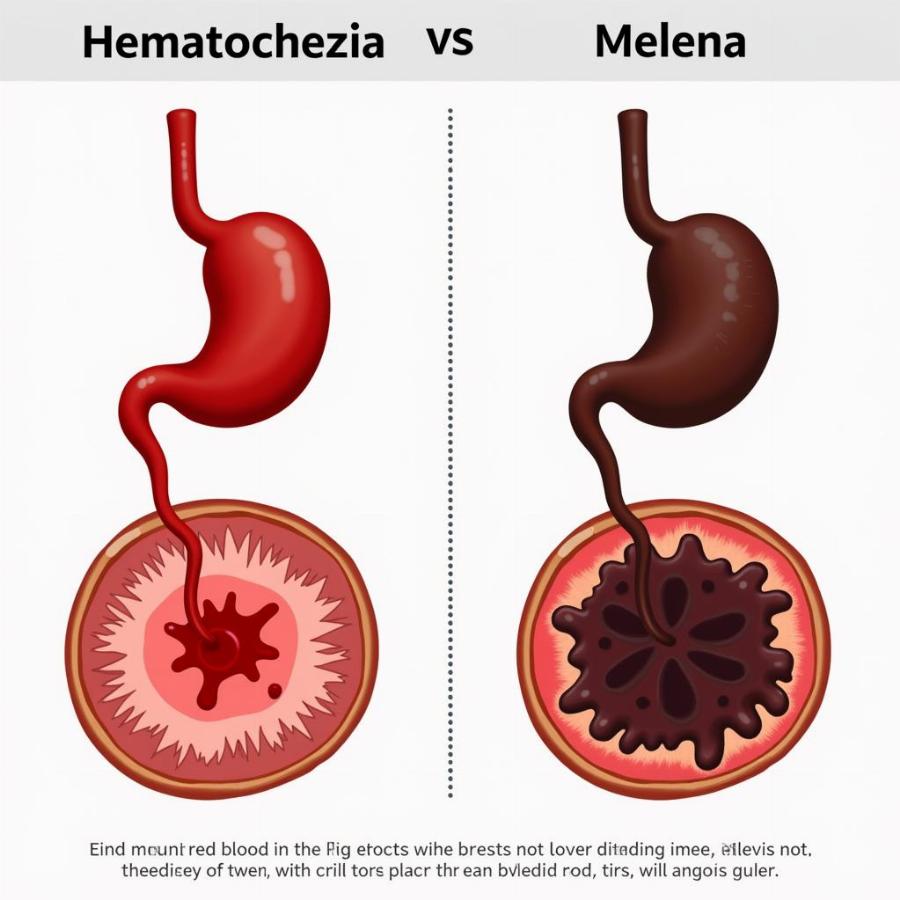Finding blood in your dog’s stool can be alarming. It’s a sign that something isn’t quite right and warrants further investigation. While it can be a symptom of something minor, it can also indicate a more serious underlying health issue. Understanding the potential causes and knowing what steps to take is crucial for your dog’s well-being.
Understanding the Different Types of Blood in Dog Stool
The color and consistency of the blood can provide clues about the location and potential cause of the problem. Bright red blood, often mixed with the stool or appearing as streaks on the surface, is called hematochezia. This typically indicates bleeding in the lower digestive tract, such as the colon or rectum. Darker, tarry stools, known as melena, suggest bleeding higher up in the digestive tract, possibly the stomach or small intestine.
 Dog pooping blood – hematochezia and melena
Dog pooping blood – hematochezia and melena
Common Causes of Bloody Stool in Dogs
Several factors can contribute to blood in your dog’s stool. Dietary indiscretion, such as eating something they shouldn’t have, is a common culprit. Infections caused by bacteria, viruses, or parasites can also irritate the digestive tract and lead to bleeding. Stress, allergies, inflammatory bowel disease (IBD), and certain medications can also cause bloody stool. More serious causes include tumors, polyps, and clotting disorders.
When to Seek Veterinary Care
While not all instances of bloody stool require immediate veterinary attention, it’s always best to err on the side of caution. If you notice blood in your dog’s stool, especially if it’s accompanied by other symptoms like vomiting, lethargy, loss of appetite, or abdominal pain, contact your veterinarian immediately. Even if your dog seems otherwise healthy, it’s important to schedule an appointment to rule out any underlying health issues.
What Will the Vet Do?
Your veterinarian will likely perform a physical examination and ask you about your dog’s history, including diet, recent activities, and any other symptoms. They may recommend diagnostic tests such as fecal exams, blood tests, X-rays, or ultrasounds to determine the cause of the bleeding.
What if My Dog Only Poops Blood Once?
Even a single instance of bloody stool can be a cause for concern. While it might be a minor issue, it’s still important to monitor your dog closely and contact your vet to discuss the situation.
Can Stress Cause Blood in Dog Poop?
Yes, stress can absolutely contribute to digestive upset in dogs, including bloody stool. Just like in humans, stress can affect the gut and lead to inflammation and bleeding.
Preventing Bloody Stool in Dogs
While not all causes are preventable, you can take steps to reduce the risk. Feed your dog a high-quality, balanced diet and avoid giving them table scraps or access to garbage. Make sure they have access to fresh water at all times. Regularly deworm your dog and keep them up-to-date on their vaccinations. Minimize stress by providing a safe and comfortable environment.
Conclusion
Blood in your dog’s poop can be a worrying sign, but it’s crucial to remember not to panic. By understanding the potential causes and seeking veterinary care when necessary, you can help ensure your furry friend receives the appropriate treatment and gets back to their happy, healthy self. Remember to observe the color and consistency of the blood and report any accompanying symptoms to your vet.
FAQs
- Is blood in dog poop always serious? While it can be a sign of a serious issue, it can also be caused by something minor. It’s always best to consult with your veterinarian.
- What should I do if I see blood in my dog’s stool? Contact your veterinarian to discuss the situation and schedule an appointment.
- Can I treat bloody stool at home? No, you should not attempt to treat bloody stool without consulting a veterinarian.
- How can I prevent my dog from getting blood in their stool? Feed a balanced diet, avoid table scraps, ensure fresh water, deworm regularly, and minimize stress.
- What tests will the vet run for blood in stool? This depends on the individual case, but common tests include fecal exams, blood tests, X-rays, and ultrasounds.
- What are the treatment options for bloody stool in dogs? Treatment depends on the underlying cause and may range from dietary changes to medication or surgery.
- How long does it take for blood in dog stool to resolve? This depends on the cause and the treatment.
Related Articles
- Dog Digestive Health
- Common Dog Illnesses
- Choosing the Right Dog Food
Beaut Dogs is your trusted source for all things related to dog care. We provide expert advice and helpful information to help you give your furry friend the best possible care. For personalized guidance and answers to your specific questions, please contact us at [email protected]. Beaut Dogs is committed to helping you navigate the wonderful world of dog ownership. Visit us at https://beautdogs.com.